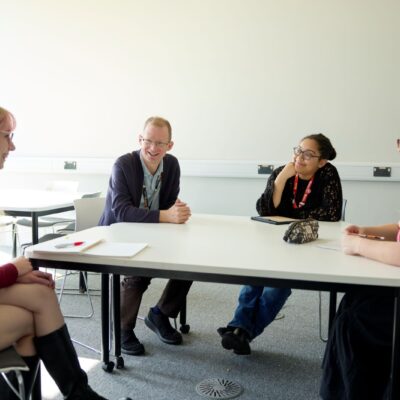Senior Lecturer in Educational Linguistics
Faculty of Business and Law

Teaching English to Speakers of Other Languages (TESOL) (Top-Up) BA (Hons)
Key Facts
-
Level
UndergraduateUG BA (Hons)
-
Duration
1 year Full Time
-
Starting
September
SEP
-
£9,535
-
£17,000
-
Waterside
Updated 09/12/2025
Updated 09/12/2025
Get in touch
For questions regarding study and admissions please contact us:
UK STUDENTS ENQUIRIES
study@northampton.ac.uk
0300 303 2772
INTERNATIONAL STUDENTS ENQUIRIES
Overview
Teaching English to Speakers of Other Languages (TESOL) (Top-Up) BA (Hons) is designed to develop your understanding of a range of linguistic phenomena and the nature of English language teaching and learning in increasingly complex and globalised educational settings.
You will be introduced to the main aspects of second language teaching theories and methodologies, combining the study of English language with practical understandings and evaluation of approaches to teaching and learning. You will also explore the role of technology in language teaching and its practical applications, and how to become an effective intercultural communicator.
The Research Project allows you to develop critical understanding and systematic evaluation of theories in your chosen topic focusing on theoretical or more practical aspects of English language teaching and learning.
Highlights
- Study English language with the key theoretical and practical issues involved in the field of Teaching English to Speakers of Other Languages (TESOL).
- Gain practical experience in applying a variety of teaching methods using micro-teaching methods (delivering short sessions to your peer group).
- Develop a methodical understanding of English language systems, focusing on key areas of language analysis.
- Explore and gain hands-on experience on how technology and electronic resources can be used in language education.
Entry Requirements
Applications are welcomed from students with a HND or equivalent qualification in one of the following subjects: English, Linguistics, Applied Linguistics, English Language, Business English, English Literature, TEFL, English and Education, Education Studies or Intercultural communication.
All International and EU students applying for a course with us must meet the following minimum English language requirements:
- IELTS 6.0 (or equivalent) with a minimum of 5.5 in all bands
for study at undergraduate level
For information regarding English language requirements at the University, please see our IELTS page.
Course Content
This TESOL (Top-Up) BA (Hons) gives you the opportunity to top-up HND/ or Diploma level qualifications (or equivalent) to a full honours degree. Students with a background in the following subjects will be considered: English, Linguistics, Applied Linguistics, English Language, Business English, English Literature, TEFL, English and Education, Education Studies or Intercultural communication.
The course focuses on developing comprehensive understanding of English language and EFL teaching methodologies, and analytical and practical skills to enable you to make informed professional choices in increasingly globalised educational contexts.
On successful completion of the programme, you will be equipped to work in a variety of professional TESOL settings globally, including mainstream education and the private sector as teachers of English as a foreign language, publishing houses and English for Specific Purposes (ESP) or IELTS preparation contexts.
Modules
EDU3041 – English Use and Intercultural Communication (Compulsory)
The purpose of this module is for students to explore intercultural competence with a view to developing and enhancing their strategies to communicate effectively across cultures. (20 credits)
EDU3043 – Theories and Contexts in English Language Teaching (Compulsory)
The purpose of this module is to develop students’ critical understanding of theories of language acquisition and learning and their application in teaching English in a global context. (20 credits)
EDU3076 – Practical Applications in English Language Teaching (Compulsory)
The purpose of this module is to develop students’ practical skills of teaching English as a foreign language. Students prepare lessons, evaluate teaching materials and assessments and develop observational and reflection skills. (20 credits)
EDU3074 – Describing and Analysing language (Compulsory)
This module develops an understanding of the language systems underpinning the teaching of English to speakers of other languages. Students focus on key areas of language analysis and acquire a solid foundation in subject terminology and how these apply to the English language classroom. (20 credits)
EDU3075 – Learning Technology in English Language Teaching (Compulsory)
In this module students evaluate the role of technology in language teaching, with particular focus on practical application. Students examine how new and existing technologies can be used to enhance learning inside and outside the classroom and use theory to make informed decisions about ethical application in their own practice. (20 credits)
EDU4009 – Research Project (Compulsory)
The purpose of this module is for students to produce an extended piece of work which explores in depth a topic focused on second language education and intercultural communication. Students will conduct independent research in order to demonstrate a comprehensive and critical understanding of their chosen topic. (20 credits)
Please note the modules shown here relate to the academic year 25/26. The modules relating to the academic year 26/27 will be available from June 2026.
How will I learn?
We use a combination of lectures, seminars and hands-on workshops along with online sources and group-based activities to enhance your learning experience.
How will I be assessed?
We use a variety of individual and group-based assessments including essays, portfolios, individual and group presentations, and projects.
Fees and Funding
Fees quoted relate to study in the Academic Year 2025/26 only and may be subject to inflationary increases in future years.
- UK Full Time: £9,535
- International Full Time: £17,000
Fees quoted relate to study in the Academic Year 2025/26 only and may be subject to inflationary increases in future years. UON will adjust UK fees annually in line with Government Policy.
There are no additional costs for this course for students beginning their studies in September 2025. Should this change, applicants and students will be contacted by the university with details of the costs.
For information on the scholarships available to you, please see our scholarships page.
For more information about possible funding options, please visit our Fees and Funding pages.
Fees quoted relate to study in the Academic Year 2024/25 only and may be subject to inflationary increases in future years.
- UK Full Time: £9,250
- International Full Time: £16,500








